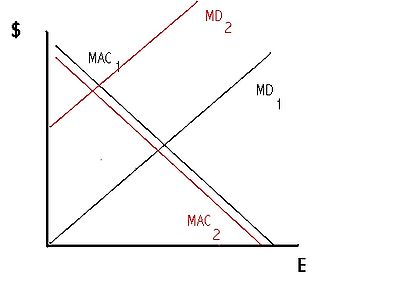Course:ECON371/UBCO2010WT1/GROUP8/Article4
Article 4 [1]
Summary
The article describes the European Union's promise that in ten years, renewable resources will power 10% of their transportation sector. Undoubtedly, there will be an increased focus on biofuels in order to achieve this goal. This will cause food prices to rise, as many biofuels come from such staples as maize and wheat. Food comprises around 80% of poor people's expenses, and any increase in price can have devastating effects. It is estimated that 16 million additional people go hungry for every one percent increase in food prices. Furthermore, farmers are being pushed off their land and not being able to feed their family. Europe's consumption is expected to raise the number of 'chronically hungry' people by 100 million, but the worldwide effect could drive that number up to 600 million. The article goes on to say that biofuels aren't an answer to climate change, as most of their emissions are even three times more damaging than carbon dioxide. To reach their goal of 10%, if using only biofuels, approximately 17.5 million hectares will need to be acquired, presumably from developing countries. ActionAid is urging member countries to avoid investment into biofuel development and turn their attention to more sustainable renewable energy sources.
Analysis
The theory that biofuels are a sustainable source of renewable energy appears fundamentally flawed. Firstly, the very fact that over a billion people are currently starving should be reason enough to dismiss any consideration for fueling the world's economy by using a resource that is already scarce. The biggest concern is what effect such projects would have on world food prices. These would jump dramatically if there was an increased demand, and this would destroy many people's livelihoods. If the developed world therefore makes itself dependent upon such biofuels, we can only imagine who would be most affected in the event of a massive worldwide shortage.
Secondly, the article spoke of impoverished farmers losing their land and being pushed to areas that have not been affected by agricultural activities. This, in turn, will undoubtedly lead these farmers to tear up that land to support themselves, feeding a terrible, vicious cycle. The agricultural sector is already being blamed for many environmental problems we currently face. The use of farm machinery, pesticides and fertilizers, clearcutting, slash-and-burn and countless other unsustainable farming practices lead to even worse conditions for the environment. These factors all contribute to releasing - and preventing the absorption of - greenhouse gases.
Thirdly, if we were to observe the effects of increased implementation of biofuel programs in terms of CO2 emissions, we would only be hearing half the story. It is true that there would be a downward shift of the marginal abatement cost curve and a total reduction in CO2 emissions. This is because if output is measured in terms of energy, then we will see a reduction in CO2 for every unit of output. Here, we are classifying the production and consumption of biofuels as a green good, and when consumers switch to using green goods, the marginal abatement cost curve shifts down.

At first, this seems like an advantageous and favourable policy to adopt. However, if we were to measure the effect of biofuel production and consumption upon the levels of greenhouse gas emissions, we would see a different picture. Carbon dioxide may be the most prominent greenhouse gas, but it isn't the worse. ActionAid states that most biofuel emissions are even three times more damaging than CO2. This would have the effect of shifting the marginal damage curve upwards significantly and more than negate any advantage to a downward shift in marginal abatement costs. This is because each unit of emissions - thanks to increased nitrous oxide concentrations - is now more damaging to the environment. Additionally, such an increase in damages would invariably accompany an increase in total abatement costs.

There may be many benefits to implementing large-scale biofuel projects, but are these enough to compensate for the devastating consequences that accompany them? Clearly, there is much debate surrounding this topic, and those answers aren't quite clear. To me, it seems offensive and distasteful to use staple foods such as maize and wheat - upon which billions of people depend on for survival - as a means for transporting a decidedly overweight Western populace. The consumption and further production of biofuels may prove beneficial - but to who?
Prof's Comments
Nice analysis, particularly recognizing and showing the impact of the higher impact emissions of the other pollutants produced. The importance of insecure property rights is also highlighted in this article, and should have been commented on too. Poor people are being dispossessed of their land, without compensation. If their property rights were secure, how would this affect the outcome?